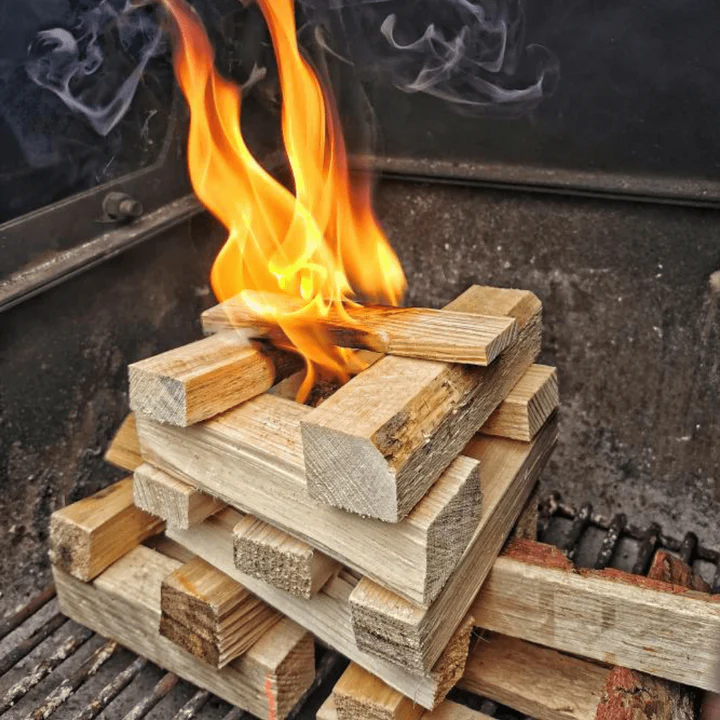Fueling Your Fire: How Fire Logs and Briquettes Outperform Traditional Firewood

Table of Contents
In the realm of heating and ambiance, the choice of fuel can significantly impact not only the warmth of your space but also the convenience, efficiency, and environmental footprint of your heating method.
While traditional firewood has been a staple for centuries, modern innovations have introduced alternatives like fire logs and wood briquettes that offer distinct advantages. In this article, we delve into the characteristics and benefits of fire logs and briquettes, highlighting how they outperform traditional firewood in various aspects.
The Advantages of Fire Logs
- Energy Density: Fire logs stand out for their remarkable energy density. Unlike traditional firewood, these logs are denser and more compact, packing a higher amount of energy per unit volume. Thanks to the compression process during manufacturing, excess moisture is removed, resulting in a fuel source that burns longer and hotter. This enhanced energy density ensures a more efficient combustion process and a consistent, sustained heat output.
- Convenience: Fire logs excel in terms of convenience, offering users a hassle-free heating experience. Unlike irregularly shaped firewood, fire logs boast a uniform size and shape, making them incredibly easy to stack, store, and handle. Gone are the days of struggling with cumbersome logs that require chopping or splitting. With fire logs, homeowners can save valuable time and effort while enjoying a fuel source that is readily accessible and user-friendly.
- Cleanliness: One of the most appealing aspects of fire logs is their cleanliness. Compared to traditional firewood, which often produces excessive ash and smoke, fire logs burn with minimal residue and emissions. This results in a cleaner burn and improved air quality, particularly indoors. By reducing the amount of ash and smoke generated, fire logs contribute to a healthier environment and alleviate the need for frequent chimney cleaning. This makes them an ideal choice for households looking to minimize indoor air pollution and maintain a clean living space.
- Versatility: Fire logs offer unparalleled versatility, catering to a wide range of heating needs and applications. Whether used in fireplaces, wood stoves, fire pits, or outdoor grills, these logs deliver a consistent and reliable burn. Their uniform size and composition ensure a predictable performance, regardless of the heating device utilized. Moreover, some fire logs are specifically designed for specialized applications, such as cooking or smoking food. This versatility expands the possibilities for users, allowing them to enjoy the benefits of fire logs in various settings and activities.
The Benefits of Wood Briquettes
Wood briquettes, also known as biomass briquettes, represent a significant leap forward in heating technology, offering numerous advantages over traditional firewood. Crafted from compressed biomass materials such as sawdust, wood chips, or agricultural residues, wood briquettes offer a range of benefits:
- Higher Energy Efficiency: The compressed nature of wood briquettes results in a significantly higher energy density compared to regular firewood. This means that they burn more efficiently and sustainably, providing a longer-lasting and more consistent heat output. Their uniform composition and compact structure ensure optimal combustion, leading to reduced fuel consumption and increased heating efficiency.
- Environmental Sustainability: By utilizing renewable biomass sources, wood briquettes contribute to environmental sustainability and resource conservation. Unlike fossil fuels, which deplete finite resources and contribute to carbon emissions, wood briquettes are derived from organic waste materials such as sawdust or agricultural residues. This not only helps reduce greenhouse gas emissions but also minimizes waste disposal and promotes the efficient use of natural resources.
- Reduced Storage Space: One of the most notable advantages of wood briquettes is their compact size and uniform shape, which require significantly less storage space than traditional firewood. This is particularly beneficial for homeowners with limited storage capacity or urban dwellers living in confined spaces. Additionally, the compressed nature of briquettes prevents them from expanding or rolling, further optimizing storage efficiency and convenience.
- Consistent Quality: Wood briquettes undergo a standardized manufacturing process, ensuring uniform quality and performance. Unlike traditional firewood, which may vary in moisture content and burn characteristics, briquettes offer predictable combustion properties. This consistency makes them easier to handle and use, providing a reliable heating source for homes, businesses, and outdoor recreational activities.
Choosing the Right Fuel for Your Needs
- Assessing Heating Requirements: Consider the specific heating needs of your space. Fire logs and wood briquettes offer different burning characteristics that cater to varying heating demands.
- Storage Space Availability: Evaluate the amount of storage space you have for fuel. Traditional firewood often requires more storage area due to its irregular shape and size, whereas fire logs and wood briquettes are compact and stackable, making them ideal for homes with limited storage capacity.
- Environmental Impact: Take into account the environmental implications of your fuel choice. While traditional firewood may seem eco-friendly, the process of harvesting and transporting wood can have adverse effects on forests and ecosystems. Fire logs and wood briquettes, made from sustainable sources and often utilizing waste materials, offer a greener alternative with reduced carbon emissions.
- Convenience and Ease of Use: Consider the level of convenience you desire in your heating fuel. Traditional firewood requires chopping, splitting, and stacking, which can be time-consuming and labor-intensive. Fire logs and wood briquettes, on the other hand, come pre-formed and ready to use, simplifying the heating process and saving you time and effort.
- Long-term Cost Analysis: Evaluate the cost-effectiveness of each fuel option over the long term. While traditional firewood may seem cheaper upfront, the efficiency and longer burning times of birch logs and wood briquettes can result in cost savings over time, as you’ll need less fuel to achieve the same level of warmth.
- Compatibility with Appliances: Consider the type of heating appliances you have and ensure compatibility with your chosen fuel. While traditional firewood can be used in most wood-burning stoves and fireplaces, fire logs and wood briquettes may require specific appliances designed to accommodate their size and burning characteristics.
- Quality and Consistency: Assess the quality and consistency of the fuel you’re considering. Traditional firewood can vary widely in moisture content and burn efficiency, depending on factors such as wood species and storage conditions. Fire logs and wood briquettes undergo a standardized manufacturing process, ensuring uniform quality and predictable burning characteristics.
- Local Regulations and Restrictions: Check for any local regulations or restrictions on the use of certain fuels in your area. Some regions may have bans or limitations on the use of traditional firewood due to air quality concerns, while others may offer incentives or rebates for using cleaner-burning alternatives like fire logs and wood briquettes.
Conclusion
As we strive to adopt more sustainable and efficient heating practices, the demand for alternative fuels like fire logs and wood briquettes continues to grow. By harnessing the energy density and convenience of these modern alternatives, homeowners can enjoy cleaner, longer-lasting fires while reducing their reliance on traditional firewood and fossil fuels. Whether you’re cozying up by the fireplace or grilling in the backyard, choosing the right fuel can make all the difference in fueling your fire effectively and responsibly.






